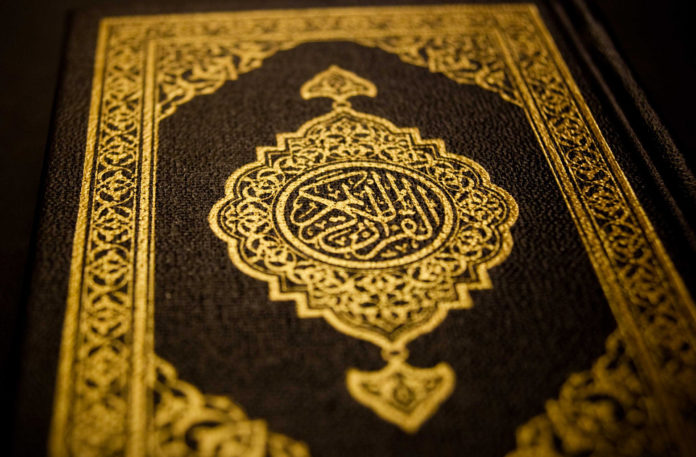| “Say: ‘Are those who know equal to those who do not know?'”[1] |
| “Indeed, Allah conferred a great favour on the believers when He sent among them a Messenger from among themselves, reciting unto them His verses (al-Qur’an) and purifying them, instructing them [in] the Book (al-Qur’an) and al-Hikmah (Wisdom and the Sunnah of the Prophet), while, before that, they had been in manifest error.”[2] |
The Muslim Jama ‘ah which strives to raise the word of Truth and carries out the instructions of Allah, enjoins good and forbids evil, fights to protect the Religion of Allah, strives hard to establish the Islamic Caliphate, and aims to bring people to the worship of their Lord, is specially in need of knowledge to guide it and outline its course of action.
This Muslim Jama’ah of ours inherited these duties from the Prophet ﷺ and should therefore take this bequest as a provision for the journey. The Prophet ﷺ said,
| “The Prophets transfer neither dinar nor dirham by inheritance. They only transfer knowledge by inheritance. Therefore, he who acquires this [knowledge], receives an ample share.” [3] |
Mu’adh bin Jabal put it so eloquently when he said,
| “Through it (knowledge), blood ties are preserved and through it Halal is distinguished from Haram. It is a leader and conduct is its follower. It is given to the fortunate and withheld from the unfortunate.” |
If the Muslim Jama’ah wishes to work for the faith of Allah, it should seek knowledge of the Deen. It must learn the ‘Aqeedah of its meritorious predecessors, lest it should go astray and become heretic. It should acquire this knowledge to understand its religion best, teach it to others and call to Islam through it,
| “Say: this is my Way: I call unto Allah with sure knowledge, I and those who follow me. “[4] |
The Muslim Jama’ah must learn how and when to enjoin good and forbid evil. It must learn how to wage Jihad and against whom it must be waged. It must learn about whom we should take as friends and whom we should we should take as enemies. If, however, the Muslim Jama’ah fails to learn these things, it will certainly experience defeat, loss, and misguidance, for he who worships [Allah] without knowledge is like a traveller taking the wrong road. Ibn Rajab Al-Hanbalee said,
| “He who travels along a path without knowledge, thinking that it leads to Paradise, has indeed taken the most difficult of paths which will not take him to his destination, despite its difficulty.” |
Knowledge is a necessity for those seeking Allah’s Pleasure and success in the Hereafter. For such a person, the need for knowledge is greater than his need for food or drink. The Prophet ﷺ said,
| “He who sets foot on a path in the quest of knowledge, Allah will facilitate for him the path to Paradise.”[5] |
Ibn Rajab Al-Hanbalee said on the explanation of this Hadeeth,
| “Knowledge leads to Allah through the shortest and easiest paths. So, whoever sets foot on Allah’s path and does not swerve from it will definitely reach Allah and Paradise through the shortest and easiest paths. ” |
For those who wish to be among the pious, knowledge is the road to piety. One of the Salaf said, “How could one be pious if he does not know what things to avoid?”
Ma’roof Al-Karkhi said, “If you do not know how to fear Allah, you will certainly eat riba (usury). “
Ibn Rajab Al-Hanbalee said, “The essence of piety is that the servant should know first what to avoid and then avoids it.”
Those who want to be reliant on Allah must learn what reliance is, for otherwise they will omit to adopt the necessary means and tools of success and fall into error, while at the same time delude themselves that they are reliant on Allah, such as a man who goes out to fight without weapons, claiming to be relying on Allah’s assistance.
Those who seek to be patient and enduring should take knowledge as their vehicle to this aim; otherwise, they will be humiliated, thinking that their suffering is a kind of endurance.
Knowledge is the guide to every deed, whether it is a deed of the heart, of the limbs or of the tongue. Indeed, knowledge is the ‘door’ of every deed; and Allah commands us in the Qur’an to seek knowledge. This is the reason why men of knowledge are accorded such high status and regarded as heirs of the Prophets,
| “Say: ‘Are those who know equal to those who do not know?'”[6] |
| “It is only those who have knowledge among His slaves that fear Allah.[7] |
It is for this reason that knowledge and the Ulama who possess it assume great importance in Islam to the extent that it has been said that a single alim is more formidable against the devil than a thousand devout persons. This is also the reason why Imam ‘Ali bin Abee Talib divided people into three categories: an Allah-fearing alim, a learner seeking salvation and unruly masses who follow any call or banner.
Adherents of the Muslim Jama’ah who work for Islam can either be of the first type or the second, but woe to them if they are of the third.
The knowledge we need has been concentrated by the scholars into two areas: knowledge of Allah, and knowledge of His instructions.
The first type concerns knowledge of Allah’s Names and Attributes. Such knowledge provides the Muslim with fear, humility, obedience and submission to Allah. It is the most honourable and highest type of knowledge because its subject is Allah (SWT). Many of our pious predecessors said, “Knowledge is not a matter of many narrations, but it is a matter of fearing Allah.” Others said, “Sufficient is knowledge which brings about fear of Allah.” Hudhaifah bin Al-Yamaan said, “The first aspect which is lifted from knowledge is humility. ”
The second type concerns knowledge of what is Halal (lawful), what is Haram (prohibited) and also the knowledge of such things as the various legal rulings and how to reach them. Every Muslim is,therefore,required to learn enough of this for his worship and social conduct to invite Allah’s acceptance. He should learn what he needs to do to in order to carry out the acts of worship such as performing ablutions, Salah and fasting. Furthermore, every Muslim who has wealth should learn about what he is obliged to do with it with regard to Zakah, Hajj and Jihad. Merchants should learn which transactions are permissible and which are not. This is why ‘Abdullah bin ‘Umar said, “Only those who have understanding of religion can sell in our markets.”Imam Ahmad bin Hanbal said, “The knowledge a person must have is that which he has to acquire in order to perform his Salah and establish his faith.”
The second type of knowledge is an obligation of two types: obligation of individual responsibility (Fard ‘Ain) which every Muslim is required to undertake to validate his worship, his dealings, and his belief; and an obligation of collective responsibility (Fard Kifaayah) which all those qualified to undertake it will be deemed sinners if they fail to do so. This type includes Hadeeth sciences, transmitters of the Hadeeth, inheritance and source methodology in Islamic jurisprudence (Usool al-Fiqh al-Islami).
So, what is the type of knowledge that the Muslim Jama’ah needs? And how much should it drink from its nourishing well?
All members of the Jama ‘ah are required to possess sufficient ‘knowledge of Allah’ to enable them to obey Him, undertake His commands and shun disobeying Him. They should compete with one another to acquire this knowledge, for those who know the most are the closest to Allah. Then they should acquire the knowledge whereby their ‘Aqeedah, as well as their worship and dealings with others, is correct and acceptable to Him. This is an obligation of individual responsibility, each in accordance with what he requires for his faith and worldly affairs.
Every member who is responsible for carrying out a given task should acquire the required knowledge so as to discharge his duty in the best possible manner. Those entrusted with the responsibility for the treasury, for example, should learn everything concerning the appropriate and acceptable sources of income and its ways of expenditure. Likewise, those charged with the task of Hisbah ought to learn the relevant knowledge relating to their duties.
In addition, there should be a group of people whose duty is to acquire the knowledge considered an obligation of collective responsibility, especially that which relates to the role played by the Jama’ah and its functions. These are entrusted with insuring that the Jama’ah is always regulated in its moves by the Shari’ah.
Above all, the Jama’ah must not admit in its ranks those scholars whose ‘knowledge of Allah’ is so little, because, despite their knowledge of what is forbidden, they persist in practising it and may even issue a verdict deeming the prohibited, permissible. They also know full well the obligations, but they abandon them and license others to forsake them.
These scholars who do not fear Allah and are devoid of piety will undoubtedly bring calamity to the Jama’ah and its activities. ‘Umar bin Al-Khattab rightly said,
| “What I fear most for you is a hypocrite with a knowledgable tongue.” |
1 Surah Az-Zumar (39), Ayah 9.
2 Surah Ale-Imran (3), Ayah 164.
3 Ibn Maajah.
4 Surah Yusuf (12), Ayah 108.
5 Ibn Maajah.
6 Surah Az-Zumar (39), Ayah 9.
7 Surah Faatir (35), Ayah 28.
8 Surah Ar-Rum (30), Ayat 2-4.






















